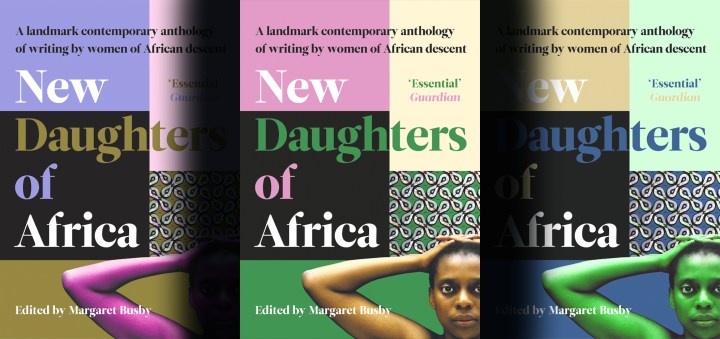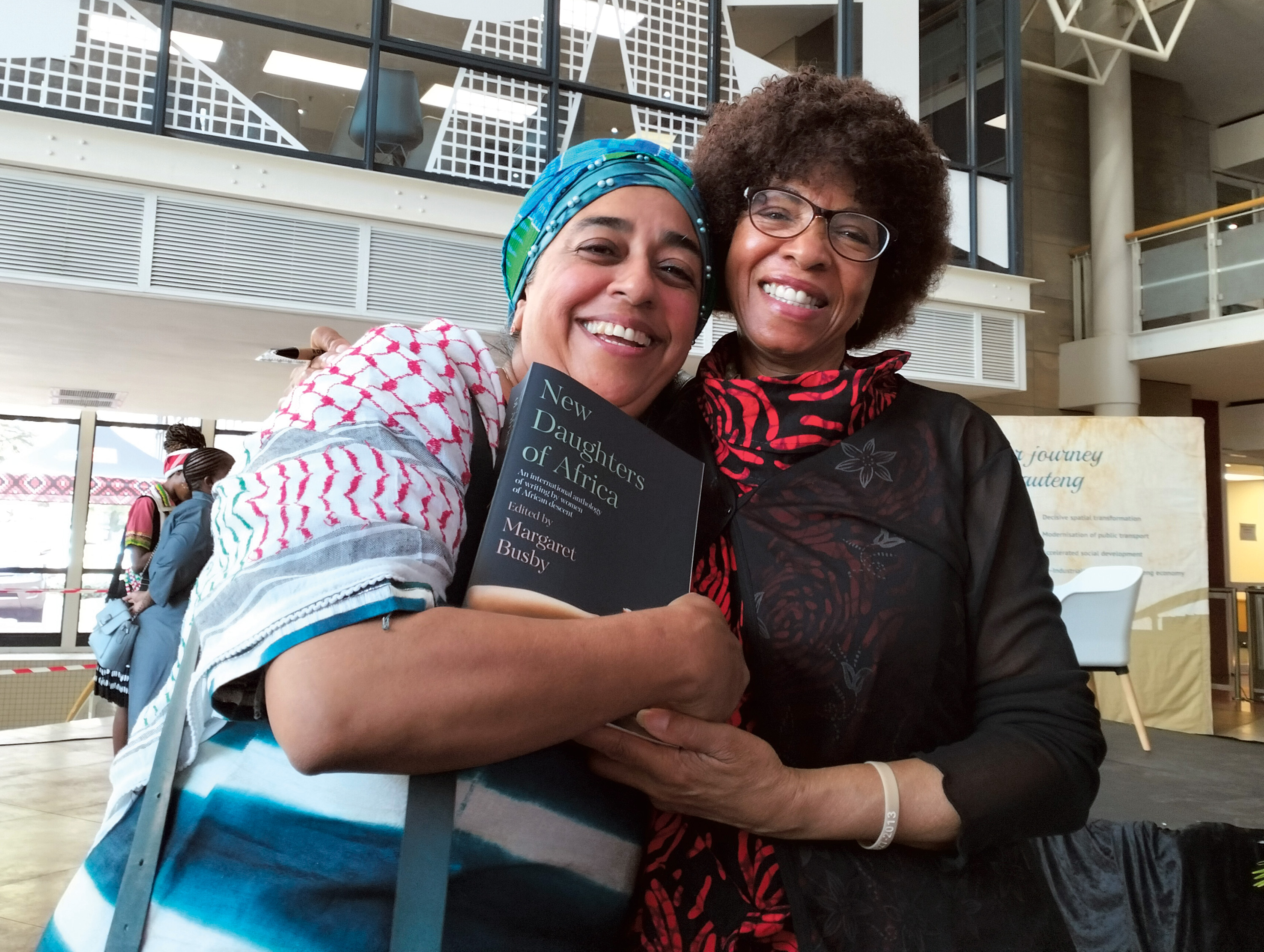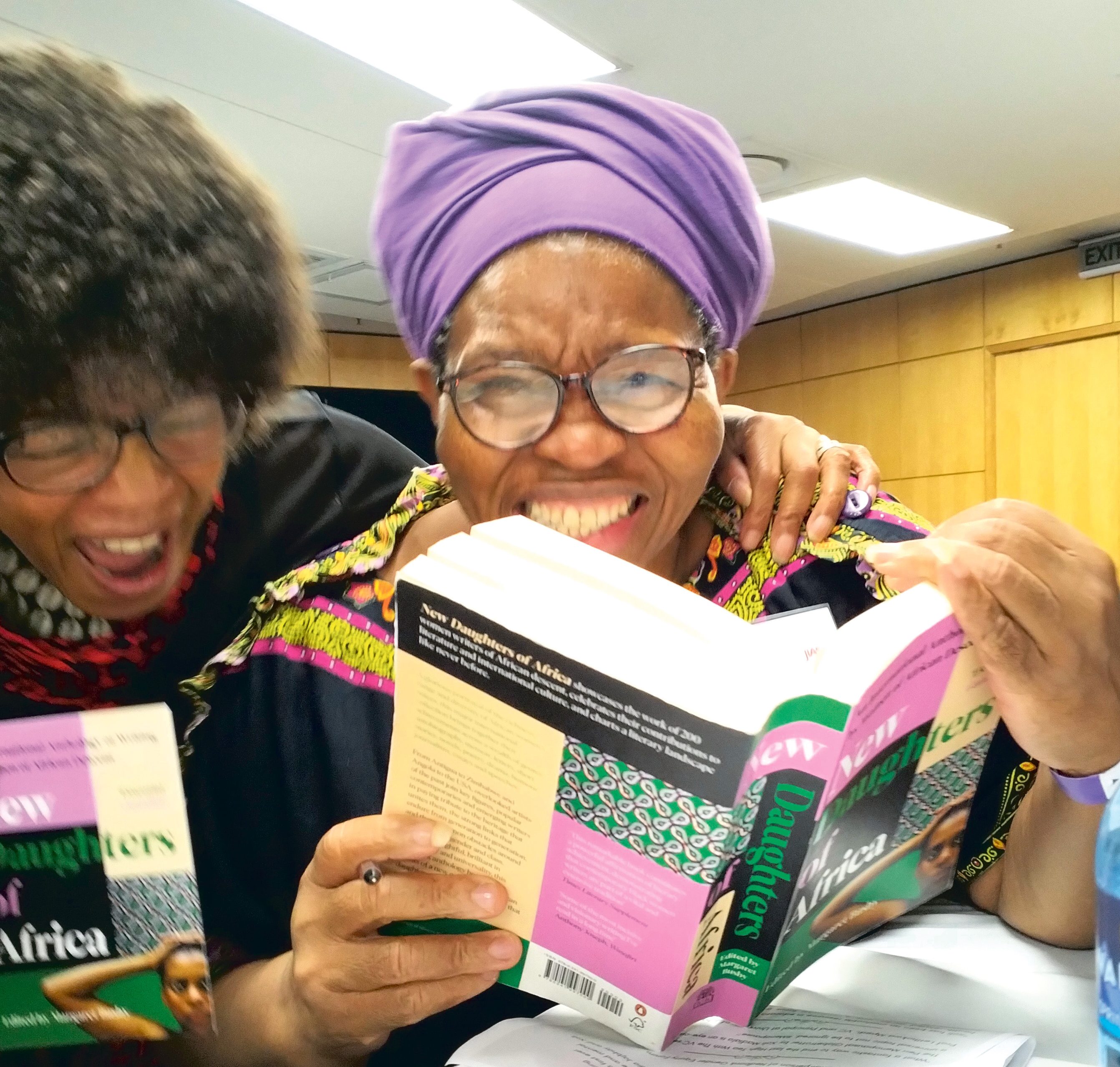BOOK REVIEW
New Daughters of Africa — expanding the breadth of crucial intergenerational conversations

Margaret Busby’s anthology celebrates the power of compelling voices.
A seminal, international anthology of writing by women of African descent “from the ancient Egyptian to the present”, Daughters of Africa was edited by Ghanaian pioneering publisher, writer and editor Margaret Busby. A lover gave me a copy of the 1992 edition, which is probably why I became a writer.
Seventeen years later I was honoured to be included in the New Daughters of Africa, alongside a selection of Africa’s most compelling voices — poets, storytellers, rhetoricians — all commenting, critiquing and fantasising about a world opening its doors to let us in.
On 10 March, Busby delivered a keynote address at the second edition of the Johannesburg Festival of Women Writers, with the prescient theme of “intergenerational conversations”. The festival, which was held at the University of Johannesburg (UJ), was initiated by Elinor Sisulu, Barbara Masekela and a handful of committed writers.
A collector of treasures
After completing her degree in literature at Bedford College in the UK, Busby and her varsity buddy became business partners and set up the publishing house Allison & Busby.
“Back in the 60s, the idea of the black African woman being a publisher was outrageous,” she says. “I was a freak in that societal moment.”
After 20 years of publishing a significant number of African-authored titles, she worked as a freelance editor and consultant before creating the first Daughters of Africa.
She tells me how she wrote to Wole Soyinka, criticising his Poems of Black Africa, which featured only one or two women in its almost 400 pages, contributing to the false impression that “women were not being creative, were not writing”.
She had been collecting books and magazines since her teens, and she compiled the Daughters anthology by selecting from what she had available.
“You’d know of Toni Morrison or Alice Walker or Mary McLean, but you wouldn’t know of anybody else in the world who was writing, and I thought, what about all the names you haven’t heard of? They’re not given the space they deserve.”
The rich diversity in both collections suggests that Busby, before being a reader and editor, is at heart a collector of treasures, to borrow from the iconic writer Bessie Head.
When asked about the principles that govern her choices of the writing she included in the first Daughters of Africa, she said, “In the first book, it was things I resonated with”, but by the time the second book came out, it was after Barack Obama’s term in office, and the politics of representation had changed significantly.
“I used to collect cuttings, any time I saw anything black, whether literature, politics or art, you’d cut it out because there was such little representation of subject matter that reflected your heritage or your identity. When Obama came on the scene I stopped, because I couldn’t keep up.”

Activist, writer and development consultant Ayesha Kajee (left) with Margaret Busby at the Johannesburg Festival of Women Writers. (Photo: Supplied)
Her curatorial muscle draws from her curiosity about what she does not know, in conversation with that with which she is intimately familiar.
“I didn’t create myself. I didn’t materialise out of nowhere,” she says. “I come from my parents, from the community I have connected with all my life, whether it’s school friends…” she breaks off to point out a ring, a necklace, a pair of earrings.
“A friend gave this to me when I was 15, and this was from another friend. There are all the people you’ve met along the way, the people you’ve learnt from, and the family whose genes you inherited.”
Busby hails from pioneering pan-Africanists, whose lives she celebrates in the keynote address she gave at UJ the night before the festival proper began, and probably draws from with each creative decision.
“My maternal grandfather, George James Christian, participated in the first Pan-African Conference held in July 1900 over three days in Westminster Town Hall. He addressed a session devoted to South Africa on the theme “organised plunder and human progress have made of our race their battlefield”, demonstrating his identification with the African continent.
Six decades later, Busby credits the unique and sparkling talent of Noni Jabavu with her passion for literature, and her belief that she could have a career for herself.
After school, she would browse bookshops for magazines, and in 1961, “I happened upon a magazine called John O’London’s Weekly, and the caption to the large cover photograph read: “Noni Jabavu. The author of the highly successful book, Drawn in Colour, now in its fourth printing, leaves London today on the first stage of an all-African writing tour”.
“I still have a copy of that magazine. I immediately felt connected with Ms Noni Jabavu. She too had been educated in Britain from the age of 13. She was to become the first African woman to be the editor of a British cultural journal when in 1961 she took the helm at The New Strand,” Busby told an enthralled audience.
Much later in South Africa, iconic Makhosazana Xaba encountered Jabavu’s Drawn in Colour and 20 years of research later, has published, along with scholar Athambile Masola, a collection of Jabavu’s Daily Dispatch columns.

Writer, poet, editor and scholar Makhosazana Xaba (right) with her mentor Margaret Busby. (Photo: Supplied)
Celebrating creativity
The material in both volumes of Daughters of Africa is not all the writing by African women. “I’m not saying these are the only people you should read, or that anyone who’s not in these volumes doesn’t count. I’m saying, here are a couple of hundred in the first volume, a couple of hundred in the other, and in the first book, a thousand-page bibliographical section at the back lists hundreds of other books and other sources.”
For Busby, “what makes me feel warm about this book is all the wonderful material in it, this legacy, and that all the new daughters are supporting each other as well as supporting the next generation.”
The New Daughters of Africa contributors waived their royalties so that the Margaret Busby New Daughters of Africa Award could be established, supporting black African women to do a master’s degree at London University’s School of Oriental and African Studies.
“Idza Luhumyo, the 2021 winner, went on to win the Caine Prize in 2022,” Busby notes with pride.
Busby, who was at the Time of the Writer conference in eThekwini recently, ended her keynote with words of encouragement and solidarity. “Let us keep the interactions going beyond this conference, let us continue to celebrate and cherish the privilege of being linked in that intergenerational chain of creativity, which can only make us all forever stronger.”
If you have daughters, buy them each their own copy of Daughters of Africa. Who knows what could happen? DM
Phillippa Yaa de Villiers teaches creative writing at Wits University.
This story first appeared in our weekly Daily Maverick 168 newspaper, which is available countrywide for R29.



















 Become an Insider
Become an Insider
Comments - Please login in order to comment.